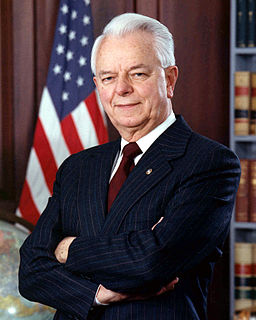A Quote by Oscar Arias
The problem with basing weapons sales on strategic interest is that these interests tend to shift over time, while weapons are durable goods that do not evaporate as quickly as some alliances do. Once supplied, they can't be taken back. That leads to situations such as the ones we have seen in Iraq, Somalia.
Related Quotes
Iran's goal is not to become another North Korea - a nuclear weapons possessor but a pariah in the international community - but rather Brazil or Japan, a technological powerhouse with the capacity to develop nuclear weapons if the political winds were to shift, while remaining a nonnuclear weapons state.
Change of regime with respect to Iraq had nothing to do with this; it had everything to do with the fact that Iraq had weapons of mass destruction. And at the time change in regime as a policy came into effect in 1998, it was seen as the only way to compel Iraq to get rid of its weapons of mass destruction.
What is the only provocation that could bring about the use of nuclear weapons? Nuclear weapons. What is the priority target for nuclear weapons? Nuclear weapons. What is the only established defense against nuclear weapons? Nuclear weapons. How do we prevent the use of nuclear weapons? By threatening to use nuclear weapons. And we can't get rid of nuclear weapons, because of nuclear weapons. The intransigence, it seems, is a function of the weapons themselves.
Our President feels, and apparently many in the United Nations Security Council feel, that it is necessary to disarm Iraq before Iraq can again use weapons of mass destruction on her neighbors or she makes some liaison with terrorists who will use these weapons either against Iraq's neighbors or ourselves.
The last UN weapons inspectors left Iraq in October of 1998. We are confident that Saddam Hussein retains some stockpiles of chemical and biological weapons, and that he has since embarked on a crash course to build up his chemical and biological warfare capabilities. Intelligence reports indicate that he is seeking nuclear weapons.
Whereas Iraq has consistently breached its cease-fire agreement between Iraq and the United States, entered into on March 3, 1991, by failing to dismantle its weapons of mass destruction program, and refusing to permit monitoring and verification by United Nations inspections; Whereas Iraq has developed weapons of mass destruction, including chemical and biological capabilities, and has made positive progress toward developing nuclear weapons capabilities
While we were never able to provide 100 percent certainty regarding the disposition of Iraq's proscribed weaponry, we did ascertain a 90-95 percent level of verified disarmament. This figure takes into account the destruction or dismantling of every major factory associated with prohibited weapons manufacture, all significant items of production equipment, and the majority of the weapons and agent produced by Iraq.
At another location, we found barrels of chemical material that was intended for use as biochemical weapons. Everyone talks about there being no weapons of mass destruction in Iraq, but they seem to be referring to completed nuclear bombs, not the many deadly chemical weapons or precursors that Saddam had stockpiled.































